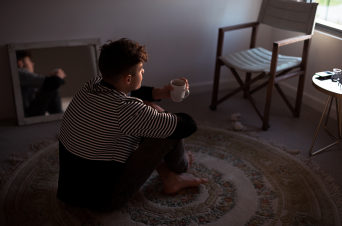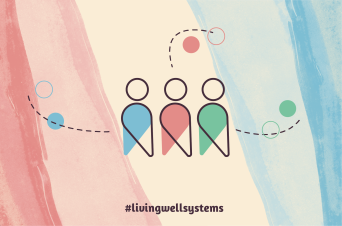
The Power of Story
blog | 02 Jul 2020
Our work as part of the Living Well UK Programme has shown us that stories are vital for producing change and improving people’s lives.
WORDS STACEY HEMPHILL & JEAN HARRINGTON
According to Paul J Zak, a neuro economist at Claremont Graduate University, a story has the power to affect our attitudes, our beliefs and our behaviours. Simply put, a compelling narrative can be responsible for the release of oxytocin that is also produced when we are trusted or shown a kindness. In turn Oxytocin enhances our sense of empathy and motivates feelings of cooperation and our ability to experience others’ emotions.
At a fundamental level stories remind us of our common humanity – what bonds rather than separates us, and importantly they connect people emotionally to others’ experiences, for example, their suffering and their triumphs. We here at Innovation Unit, through our partnership with National Lottery Community Fund in the Living Well UK Programme, have found that the gathering and sharing of stories from people with lived experience has immense power to change opinions, reshape practices and improve the quality of people’s lives.
STORY GATHERING
In what follows we share with you a snapshot of our experience of gathering stories of people who have used mental health services. We also consider the importance of gathering the stories of those who provide the services, for their lived experience too is an essential element of the mental health landscape.
We have heard time and again from storytellers – experts in their own lives – that when seeking help for their mental health, people rarely get to tell their own stories. How instead they are left un-helped by a system where standalone – often repeated – assessments are carried out by practitioners under immense pressure and how these assessments often capture and describe nothing more than a list of problems. Certainly not the essence of the person, or their inherent strengths and capabilities. In contrast, the act of the telling and the truly being heard can make a difference to both ‘patients’ and the ‘professionals’ who work with them. By engendering empathy, compassion and kindness an emotional connection is formed that can be more powerful than any intellectual or abstract reasoning, powerful enough to change entire systems.
In the Living Well UK Programme we focus on spending as much time as we can with those who have lived experience, bearing witness to their story and hopefully in so doing acknowledging ownership. We have fine-tuned what we do during this precious story gathering time to really try to capture a picture of a person’s day-to-day life. Spending time with them in their homes, or out and about with them, truly, actively, listening, making sure that they are ‘heard’, gathering as much of the essence of the person as we can, in every way we can. We also use specially designed visual tools to gather a sense of their history, their context, what is good and bad in their lives and their strengths, talents, hopes and desires. We hear about their experience of seeking help, therapeutic alliances formed, support and treatment received for their mental health, both what may have worked and in many cases what hasn’t. We hear their stories of resilience when help ends or how they fell through the gaps because support was not available at all.
We leave our storytellers having gained a rich picture of their lived experience, their perspective. For many people we find it is often the only time they have told their own story, in its entirety, in their own time, in the comfort of their own environment and in their own words. It is powerful and many have told us it is therapeutic.
STORY SHARING
Once we have collected a story the next step is to share it with the dedicated team here at the Innovation Unit. Clustered in a group with post-it notes, pens, white boards, markers and endless coffee, we hear each story, read by one of the people who heard it first hand. The stories are often painful to tell and hear; sad, shocking, anger producing. When the dust of emotion has settled the task of putting the stories to work begins. We carefully think through what we have heard. We talk. We consider. We look for similar themes that emerge in different stories, indications of concepts and systems that for many reasons may or may not be working.
We also need to create the right space for the story to be heard, felt, to inspire change, to correctly represent, be illustrative and help transform the mental health landscape of policy, services, communities and the people within it. We are very aware that stories need to be heard and shared in context, not just gathered and flaunted as ‘recovery porn’ or ‘patient porn.’ User stories are the lifeblood of practice development. They illustrate the truth of a service’s impact on the person living that life, making a case for change, showing plainly and clearly what is wrong with the current system and what is right. They are gold dust. So we work on how to maximise the value of each story. After thinking about what a story is telling us we share them, and our thoughts, with our partnership sites, to be used as powerful tools to help them redesign their local offers and systems.
COLLABORATION FOR BETTER FUTURES
Stories, many different stories, need to be heard to enable change at an organisational level. Through hearing repeated and shared experiences we can together begin to feel and understand the impact of systems and processes on local practice and in turn how that is experienced by individual people.
However it is much deeper than this, having confidence in the evidence of lived experience has an impact; the understanding of people’s stories builds a common purpose, igniting a feeling. Like a call to action. As Marshall Ganz would tell us ‘a story communicates fear, hope, and anxiety, and because we can feel it, we get the moral not just as a concept, but as a teaching of our hearts’. We are moved toward a better collective understanding, a shared culture with a unified purpose. Stories bring hope to the many actors that dwell within the landscape, whether they are termed as service users, survivors, carers, providers or mental health professionals. They inject humanity into a system that a management culture has squeezed out. Reorienting system players around the people they aim to help, particularly when this focus has been lost or when more technocratic considerations have dominated the thinking and acting. They inform our practice and provide key material for processes that then lead to improved methods.
Hearing the voices of service users challenges the dominance of professional voices. Listening to stories, understanding the impact of their efforts in the context of people’s lives can reconnect professionals and system players with ‘why’ they are there, why people have chosen their particular professions or why they have answered the call to leadership in the first place.
This is why it is so important to gather as many stories as one can. For example, the lived experience of ‘providers’, often neglected actors with their own unique context whose stories often harmonise with those of ‘users’; intricately interwoven, revealing parallel values, aspirations, disappointments and struggles. Only when we hear from all players on stage can the impact of each on the other be recognised and support for all be engendered and a ‘shared’ practice be forged. All in the landscape need to be empowered to seek possibilities and workable solutions. By making spaces for stories to live you create fertile ground for this much needed collaboration.
Telling and hearing stories humanises the failures at the heart of our way of operating. It dissolves the boundaries between humanity and professionalism. It does this safely alongside, but not within, the therapeutic alliance. It allows us all to return to altruistic, kind and caring beings, vulnerable humans operating in systems whose design can impede authenticity and stop us from putting our humanity first. By creating shared spaces for people to consider stories, ‘service users’, ‘carers’ and ‘professionals’ can become members of the same team working together for a common purpose rather than combatants each defending our own territory against the other. It can be remembered that each participates with good intentions and that as humans we want for the same things, health, love, happiness. In this working together, this coproduction, we become more than the sum of our individual parts and we can create and dream futures that benefit all.
Finally, one of the most important things we have to remember is that the story exists within the social, the political, the cultural and the economic context of its time – we ignore context at our peril. As a compelling narrative it will arouse within us an imagination of how things can be different – hope. Stories are what we tell each other in order to know what good might look like, they inspire us and they demonstrate the possibility of change. Individuals, communities, organisations and society benefit from the telling of stories. They are deeply valuable and used with care and sensitivity they have immense power.
Living Well UK is a National Lottery funded programme led by Innovation Unit. It supports four pioneering places in the UK to build Living Well systems of support for good mental health and wellbeing. Living Well systems put people’s strengths and lived experience at the centre and are designed to help people recover and stay well as part of their community.

The opportunity of a generation
How the NHS Framework for Community Mental Health Services can help us to rebuild in response to the Covid-19 crisis.
18 May 20

Stories of hope and humanity
The world is in lockdown. It is affecting our mental health, our wellbeing, our lives. Yet there is also much generosity and kindness. We want to be sharing these stories, understanding that some will be harder to tell, and to hear, than others.
18 May 20

False choices and gaps in the mental health system
Matthew Horne, Deputy Chief Executive at Innovation Unit, explains why we need new systems of support that help people to live well.
08 May 19